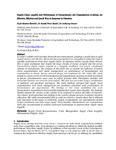Supply Chain Leagility and Performance of Humanitarian Aid Organizations in Kenya: An Effective, Efficient and Quick Way to Response to Disasters.

View/
Date
2021-06Author
Kiswili, Nyile Erastus
Shale, Ismail Noor
Osoro, Anthony
Metadata
Show full item recordAbstract
In today’s volatile and uncertain humanitarian environment, adopting a purely lean or agile supply chain is not effective. Humanitarian organizations are struggling to obtain the highest possible performance from their supply chains by adopting various supply chain designs. This is upon realization that despite the huge chunks of money pumped into the sector, humanitarian supply chains respond in a sluggish, inefficient and poorly coordinated manner to emergencies. The purpose of this study was to explore the influence of supply chain responsiveness and waste management on performance of humanitarian aid organizations in Kenya. Survey research design was employed for this study. The study entailed a census survey of 330 humanitarian aid organizations carrying out their operations in Kenya. Questionnaires were used to collect primary data. Descriptive statistics and inferential statistics was used for data analysis. The data was presented using a combination of statistical and graphical techniques. The study findings revealed that supply chain responsiveness and waste management are positively associated with performance of humanitarian aid organizations. The findings of this study established that most humanitarian organizations had partially implemented supply chain leagility. The findings further showed the essence of the country to be prepared to reduce the effect of disasters. The culture of preparedness was lacking in the country despite increase in disaster resource allocation. The study recommended that in order to achieve a supply chain that is efficient and responsive to the needs of vulnerable people, humanitarian aid organizations should design, implement and fully adopt supply chain leagility. Humanitarian aid organizations were also recommended to embrace advanced technologies to improve their supply chain leagility.
